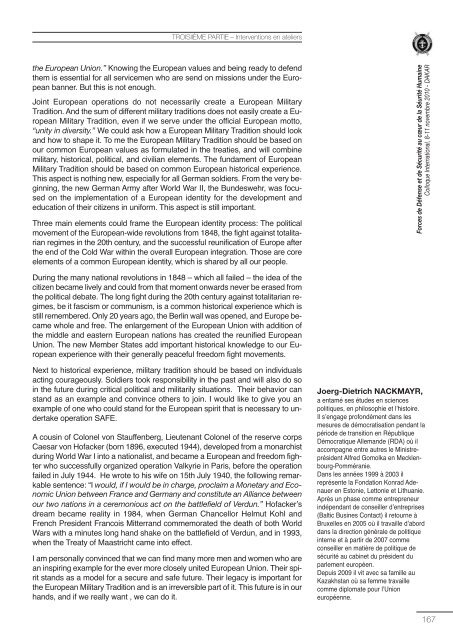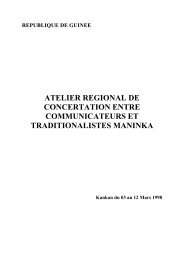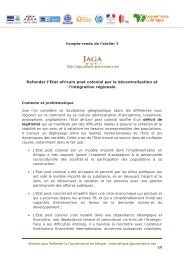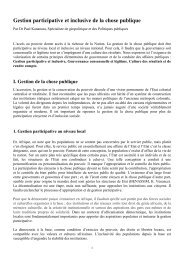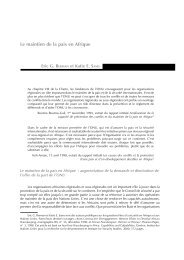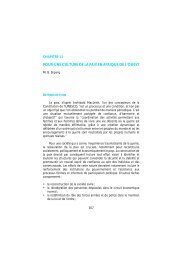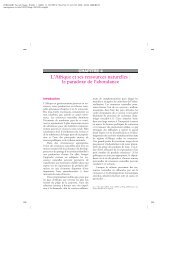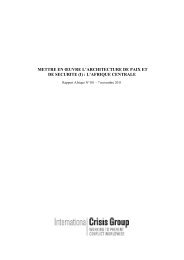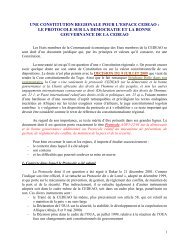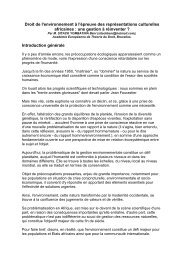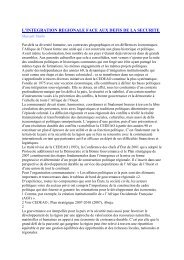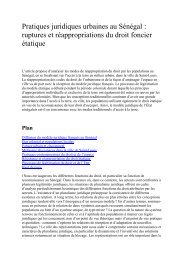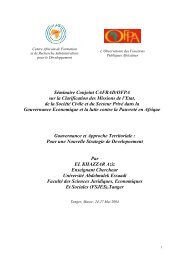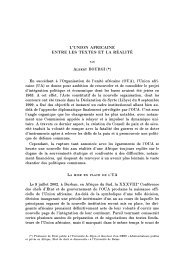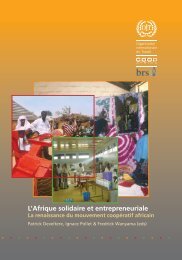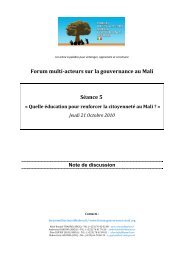Compendium - Fondation Charles Léopold Mayer pour le progrès ...
Compendium - Fondation Charles Léopold Mayer pour le progrès ...
Compendium - Fondation Charles Léopold Mayer pour le progrès ...
You also want an ePaper? Increase the reach of your titles
YUMPU automatically turns print PDFs into web optimized ePapers that Google loves.
TROISIIÈME PARTIE – Interventions en ateliersthe European Union.” Knowing the European values and being ready to defendthem is essential for all servicemen who are send on missions under the Europeanbanner. But this is not enough.Joint European operations do not necessarily create a European MilitaryTradition. And the sum of different military traditions does not easily create a EuropeanMilitary Tradition, even if we serve under the official European motto,“unity in diversity.” We could ask how a European Military Tradition should lookand how to shape it. To me the European Military Tradition should be based onour common European values as formulated in the treaties, and will combinemilitary, historical, political, and civilian e<strong>le</strong>ments. The fundament of EuropeanMilitary Tradition should be based on common European historical experience.This aspect is nothing new, especially for all German soldiers. From the very beginning,the new German Army after World War II, the Bundeswehr, was focusedon the imp<strong>le</strong>mentation of a European identity for the development andeducation of their citizens in uniform. This aspect is still important.Three main e<strong>le</strong>ments could frame the European identity process: The politicalmovement of the European-wide revolutions from 1848, the fight against totalitarianregimes in the 20th century, and the successful reunification of Europe afterthe end of the Cold War within the overall European integration. Those are coree<strong>le</strong>ments of a common European identity, which is shared by all our peop<strong>le</strong>.Forces de Défense et de Sécurité au cœur de la Séurité HumaineColloque International, 8-11 novembre 2010 - DAKARDuring the many national revolutions in 1848 – which all fai<strong>le</strong>d – the idea of thecitizen became lively and could from that moment onwards never be erased fromthe political debate. The long fight during the 20th century against totalitarian regimes,be it fascism or communism, is a common historical experience which isstill remembered. Only 20 years ago, the Berlin wall was opened, and Europe becamewho<strong>le</strong> and free. The enlargement of the European Union with addition ofthe midd<strong>le</strong> and eastern European nations has created the reunified EuropeanUnion. The new Member States add important historical know<strong>le</strong>dge to our Europeanexperience with their generally peaceful freedom fight movements.Next to historical experience, military tradition should be based on individualsacting courageously. Soldiers took responsibility in the past and will also do soin the future during critical political and militarily situations. Their behavior canstand as an examp<strong>le</strong> and convince others to join. I would like to give you anexamp<strong>le</strong> of one who could stand for the European spirit that is necessary to undertakeoperation SAFE.A cousin of Colonel von Stauffenberg, Lieutenant Colonel of the reserve corpsCaesar von Hofacker (born 1896, executed 1944), developed from a monarchistduring World War I into a nationalist, and became a European and freedom fighterwho successfully organized operation Valkyrie in Paris, before the operationfai<strong>le</strong>d in July 1944. He wrote to his wife on 15th July 1940, the following remarkab<strong>le</strong>sentence: “I would, if I would be in charge, proclaim a Monetary and EconomicUnion between France and Germany and constitute an Alliance betweenour two nations in a ceremonious act on the batt<strong>le</strong>field of Verdun.” Hofackerʼsdream became reality in 1984, when German Chancellor Helmut Kohl andFrench President Francois Mitterrand commemorated the death of both WorldWars with a minutes long hand shake on the batt<strong>le</strong>field of Verdun, and in 1993,when the Treaty of Maastricht came into effect.I am personally convinced that we can find many more men and women who arean inspiring examp<strong>le</strong> for the ever more closely united European Union. Their spiritstands as a model for a secure and safe future. Their <strong>le</strong>gacy is important forthe European Military Tradition and is an irreversib<strong>le</strong> part of it. This future is in ourhands, and if we really want , we can do it.Joerg-Dietrich NACKMAYR,a entamé ses études en sciencespolitiques, en philosophie et lʼhistoire.Il sʼengage profondément dans <strong>le</strong>smesures de démocratisation pendant lapériode de transition en RépubliqueDémocratique Al<strong>le</strong>mande (RDA) où ilaccompagne entre autres <strong>le</strong> MinistreprésidentAlfred Gomolka en Meck<strong>le</strong>nbourg-Pomméranie.Dans <strong>le</strong>s années 1999 à 2003 ilreprésente la <strong>Fondation</strong> Konrad Adenaueren Estonie, Lettonie et Lithuanie.Après un phase comme entrepreneurindépendant de conseil<strong>le</strong>r dʼentreprises(Baltic Busines Contact) il retourne àBruxel<strong>le</strong>s en 2005 où il travail<strong>le</strong> dʼaborddans la direction généra<strong>le</strong> de politiqueinterne et à partir de 2007 commeconseil<strong>le</strong>r en matière de politique desécurité au cabinet du président dupar<strong>le</strong>ment européen.Depuis 2009 il vit avec sa famil<strong>le</strong> auKazakhstan où sa femme travail<strong>le</strong>comme diplomate <strong>pour</strong> lʼUnioneuropéenne.167


